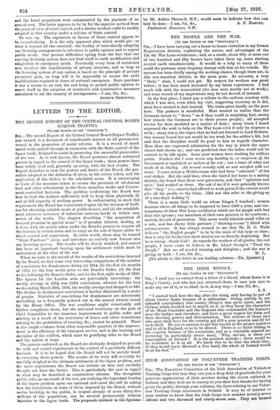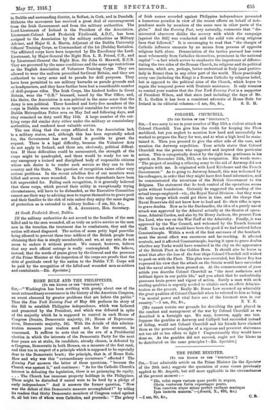IRISH ASSOCIATION OF VOLUNTEER TRAINING CORPS. [To THZ EDITOR OP
THZ " eszereeceal SIR,—The Executive Committee of the Irish Association of Volunteer Training Corps feel that they owe you a deep debt of gratitude for your generous appreciation of their services during the recent outbreak in Ireland, and they wish me to convey to you their best thanks for having given the public, through your columns, the facts relating to our Volun- teer Training Corps movement in Ireland. It may be of interest to your readers to know that the Irish Corps now number seventy-seven officers and two thousand and ninety-seven men. They are located
in Dublin and surrounding district, in Belfast, in Cork, and in Dundalk. Hitherto the movement has received a great deal of encouragement from the Irish Government and from the military authorities. The Lord-Lieutenant of Ireland is the President of the Association. Lieutenant-Colonel Lord Frederick FitzGerald, A.D.C., has been assigned to the Association by the military authorities as Military Adviser, and Major G. A. Harris, Adjutant of the Dublin University Officers' Training Corps, as Commandant of the lat (Dublin) Battalion. The affiliated corps have been inspected by His Excellency the Lord- Lieutenant, by Major-General the Right Hon. L. B. Friend, C.B., and by Lieutenant-General the Right Hon. Sir John G. Maxwell, K.C.B. They are governed by the same conditions and the same age restrictions as the English Association of Volunteer Training Corps. They are allowed to wear the uniform prescribed for Great Britain, and they are authorized to carry arms and to parade for drill purposes. They have been permitted to use military barracks as parade grounds and as headquarters, and they have further been lent a considerable number of drill-purpose rifles. The Irish Corps, like kindred bodies in Great Britain, wear the " G.R." brassard, issued by the War Office, and, like theirs, the Association is non-political in the same sense that the Army is non-political. Three hundred and forty-five members of the corps in Dublin were sworn in as special constables for service in the Dublin Metropolitan Police area on May 2nd and following days, and they remained on duty until May 11th. A large number of the out- lying corps did similar duty either under the military or constabulary authorities, and rendered most valuable service.
The one thing that the corps affiliated to the Association lack Is a military status, and, although this has been repeatedly asked for, the Government has not found it possible to grant the request. There is a legal difficulty, because the Volunteer Acts do not apply to Ireland, and there are, obviously, political difficul- ties. If these difficulties could be surmounted, the strength of the corps might be quadrupled, and there would be ready for use in any emergency a trained and disciplined body of responsible citizens whose sole desire is to render such service as they can to their country and the State. The question of recognition raises other very serious problems. In the recent rebellion five of our members were killed and seven were wounded. In five cases dependants have been left unprovided for. Failing such recognition, it is generally believed that these corps, which proved their utility in exceptionally trying circumstances, will have to be disbanded, as the Executive Committee cannot see their way to advising men to expose themselves to grave peril and their families to the risk of ruin unless they enjoy the same degree of protection as is extended to military bodies.—I am, Sir, &c., [If the military authorities do not accord to the families of the men killed and to the men wounded, all as truly on active service as the men now in the trenches, the treatment due to combatants, they and the nation will stand disgraced. The notion of some petty legal punctilio being allowed to prevent these true soldiers of the British people from obtaining their due is simply unendurable, and we, at any rate, do not mean to endure it without protest. We cannot, however, believe that any such official outrage is really contemplated. We believe, instead, that the words of praise given by the General and the presence of the Prime Minister at the inspection of the corps are proofs that the debt of gratitude owed by the nation to the Dublin V.T. Corps will be paid by the recognition of the killed and wounded men as soldiers and combatants.—ED. Spectator.]































 Previous page
Previous page